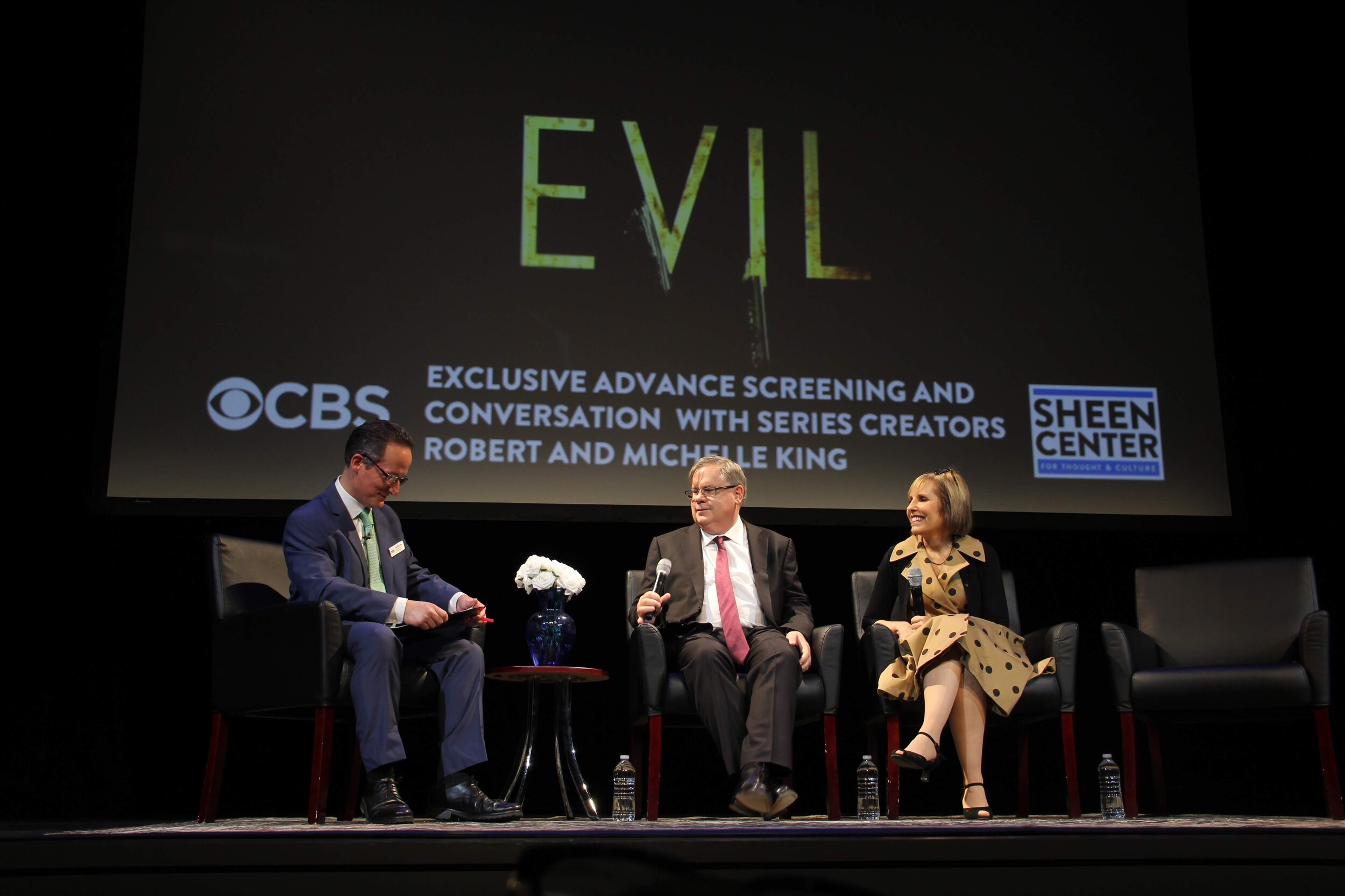New TV series 'Evil' grapples with mysteries of faith and science
Robert (center) and Michelle King (right) answer questions after premiering their new series “Evil” in New York Sept. 20. Photo by Elizabeth Vandenboom.
(TV REVIEW) A new CBS original series, “Evil,” may at first seem like other detective shows. But this whodunnit series weighs not just humans but demons as possible suspects too.
By taking a closer look at one of the most central human questions— what is evil and where does it come from?—the series’ creators want to spark thoughtful conversation on the mysteries of science and faith.
Robert and Michelle King, the husband and wife duo behind the hit series “The Good Wife,” approached this new project with unique wisdom from their personal experiences: Robert as a devout Catholic and Michelle as an agnostic Jew.
“Why do people do bad things?” Robert asked an audience after the show’s premiere in New York on Sept. 20. “You don’t have to go to the big evil of school shootings. You can go to the small evils— like an abusive boss. I look to original sin.”
“And I look to a breakdown on the psychological level,” Michelle said.
The first episode introduces viewers to a clinical psychologist played by “Westworld” star Katja Herbers. Herbers’ character, Kristen Bouchard, is a single mom and strict rationalist with little patience for meanderings in the supernatural. She is hired to determine whether an inmate accused of a brutal murder acted out of insanity.
But her cut and dry, strictly scientific approach is quickly opposed by David Acosta— played by Mike Colter. Acosta is a Catholic priest-in-training, hired to investigate the case as a potential demon possession. He has a unique day job: working for the Catholic Church to investigate their backlog of unexplained mysteries.
When people bring claims of possession, miraculous healing, or other supernatural interventions to the church, Acosta steps up to determine their veracity.
Despite Bouchard’s lack of belief, Acosta asks her to join his work, “I want your skepticism,” he says. Bouchard reluctantly accepts, and the two endeavor to find explanations for unexplainable phenomena.
The tensions between these characters, and their development throughout the series, reflect common struggles between competing explanations from science and religion. But the show also suggests that the dichotomy is not as absolute as it may seem.
“For us, it is about pointing out the mystery in everything,” Robert said. “If you can’t pass the speed of light, how is quantum entanglement possible?... Science has its own mysteries that are unfathomable— that you can’t get to the bottom of.”
The husband and wife duo, along with their team of seven co-writers, sought to bring this unavoidable mystery to the forefront of the conversation, without succumbing to cliches or moralizing.
The objective is not to push answers, but to ignite conversation and questions. The show is scary because it’s smart.
“Maybe at the end of an episode you’ll be disturbed, and you’re not quite sure what the show is trying to tell you, and maybe that’s part of the point,” Robert said.
The special effects and thematic underscore occasionally bordered on over-the-top. One scene depicts Bouchard as she is dramatically visited by a stock-photo demon. Without deviating from Hollywood norms, the dark, scaly creature emerges from a coat rack and taunts her in her sleep.
But, this perhaps cheesy depiction is redeemed by the dialogue surrounding the visit. When the inmate, claiming to speak for a demon— with eyes rolled back and occasional interjections of Latin— reveals privileged information to Bouchard, she is forced to consider the supernatural.
What really makes the series stand out is that unlike other Hollywood productions, “Evil” does not undermine the reality of personal religious experience. In the moments following this encounter, Bouchard, despite her deep skepticism, considers an alternate explanation. While she eventually discovers a materialist answer, involving stolen notes from a counseling session, her internal crisis is depicted with honesty and respect.
The comedic aspects were also tasteful and seldom distracted from the key point. Avoiding caricatures, the show relies instead on a grounded witticism to bring an element of lightness to otherwise grueling topics.
The careful blend of comedy and respectable characters effectively presents the philosophical questions at the heart of the series. If you can set aside some stylistic errors and cliche demon depictions, you will be invited to think more deeply about the nature of evil and the possibilities of the supernatural.
Elizabeth Vandenboom is a student at The King’s College and an intern for Religion Unplugged.

